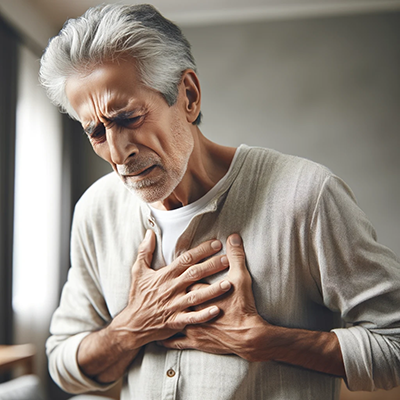The heart is the central organ of our circulatory system. It is mainly responsible for pumping blood and oxygen throughout the body. It distributes the nutrients the body needs to function, controls the flow rate, and maintains blood pressure. Even minor abnormalities in the heart can cause massive, dramatic effects on the health of the body.

As we age, normal heart function naturally declines. Aging causes the heart and the blood vessels to stiffen, and these changes create various cardiovascular conditions, such as hypertension, coronary heart disease, and heart failure. Heart disease is another health condition and concern for many seniors as it is a significant cause of death worldwide. That would concern anybody!
Maintaining regular physical activity and eating a healthy diet is imperative for good heart health. These preventive measures can help prevent high blood pressure, heart disease, and stroke, if not entirely.
Treating cardiovascular health conditions once they’ve set in is not easy, as there can be many co-existing conditions that may complicate health. Frailty and multiple medications are common issues that can arise and intervene with optimal treatment and recovery.
The changes in the heart and the blood vessels due to aging make older adults more vulnerable to cardiovascular diseases. One major cause of heart disease is the buildup of fats within the arteries. This can harden the arterial wall, known as arteriosclerosis, and cause hypertension (high blood pressure).
This buildup of plaque within the arterial wall causes the arteries to stiffen and harden over time, limiting the flow of oxygen and blood nutrients to vital organs. When the arteries become hardened, the oxygen that should reach the heart muscle becomes significantly reduced, causing heart problems and disease. Seniors’ most common heart diseases are high blood pressure, coronary artery disease, heart arrhythmia, and stroke.

Signs and Symptoms of Heart Disease
Heart disease during its early stages doesn’t often come with noticeable symptoms. However, natural preventive measures and regular check-ups with the doctor are essential for maintaining a healthy heart.
Chest pain or any pressure or discomfort in the chest can lead many to worry if a heart condition develops. However, it is not the most common symptom of heart disease. Here are the most common symptoms or signs of heart disease or condition.
- Sensations felt in the shoulders, neck, jaw, arms, or back. It may feel painful or numb or give a tingling sensation.
- Shortness of breath.
- Chest pain after physical activity.
- Confusion, dizziness, or light-headedness.
- Nausea or vomiting.
- Fatigue or tiredness.
- Cold sweats.
- Swelling in the legs, feet, ankles, stomach, or neck.
- Challenges while performing daily activities.
- Inability to exercise or get physically active.
Tips to Prevent Heart Disease

The natural process of aging may predispose us to develop heart conditions. Still, natural preventive measures can help maintain a healthy heart and delay, if not wholly, heart disease.
Stop Smoking: Smoking is one of the top causes of death, so why not stop? It is not only addictive and damaging to your lungs and the lungs of people closest to you, but it destroys your arterial wall and puts you at risk of heart disease.
Abstain From Drinking Alcohol: Alcohol, in moderate amounts, is said to be okay, but excessive drinking can put your health at risk as alcohol can disrupt your entire cardiovascular system. Alcohol may temporarily increase your blood pressure and heart rate, affecting your heart, whether in moderation or not. It is not advisable to drink alcohol if you are at a heightened risk for heart disease.

Keep Blood Sugar, Cholesterol, and Blood Pressure Under Control: With the right lifestyle changes, you can prevent or manage all three health conditions. However, follow your doctor’s advice and, if necessary, take your prescribed medications to help you manage them.
Get Regular Exercise: Regular exercise is the best way to delay and prevent the natural changes that occur in the heart. Physical activity helps mitigate the damage plaque buildup causes in the arteries by improving the muscle’s ability to receive oxygenated blood. It enables the heart to pump less blood to the muscles.
Eat Healthily: Another preventive measure to maintain a healthy heart is a healthy diet. Eating plenty of fruits and vegetables and keeping a nutritious, heart-healthy diet can go a long way in preventing and delaying heart conditions.
Avoid Stressful Situations: Your lifestyle can contribute significantly to developing any heart condition. High amounts of stress will hasten the outcome of any disease. Dis-stress causes disease. Even though stress is inevitable, finding healthy ways to manage it and lessen it with relaxation techniques will help you cope.
A healthy lifestyle, including diet, sleep, and exercise, can prevent heart disease. Preserving your life is not too hard if you are prepared to do what it takes.
DISCLAIMER: All content on this website is presented solely for educational and informational objectives. Do not rely on the information provided as a replacement for advice, diagnosis, or treatment from a qualified medical expert. If you are pregnant, nursing, or have any preexisting medical concerns, talk to your doctor before using any herbal or natural medicines.
References
- https://www.health.harvard.edu/heart-health/takotsubo-cardiomyopathy-broken-heart-syndrome
- https://www.heart.org/en/health-topics/heart-attack/warning-signs-of-a-heart-attack/heart-attack-symptoms-in-women
- https://www.diabetes.org/diabetes/cardiovascular-disease
- https://www.heart.org/en/health-topics/cholesterol/prevention-and-treatment-of-high-cholesterol-hyperlipidemia
